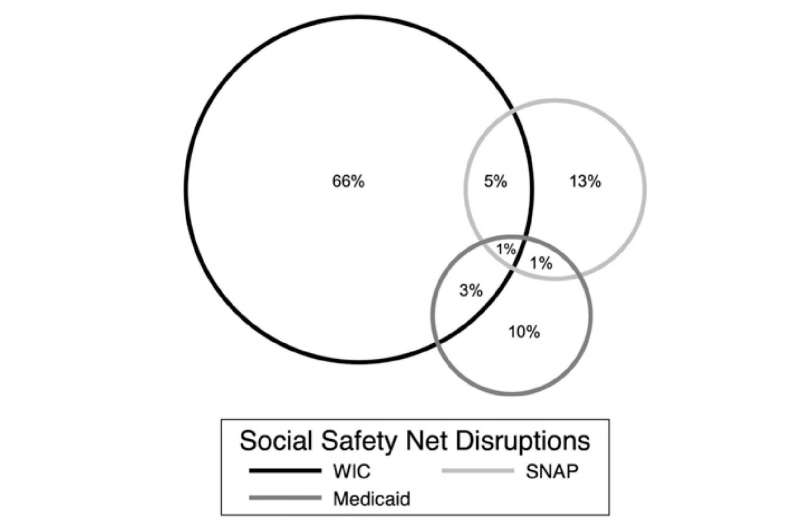This article has been reviewed according to Science X's editorial process and policies. Editors have highlighted the following attributes while ensuring the content's credibility:
fact-checked
trusted source
proofread
Study finds cost-driven housing moves lead to disruptions in federal assistance programs

Across the United States, a growing number of families with low income are being displaced from their homes due to inability to afford rising housing costs.
In a study published in Pediatrics, researchers from the University of California, Los Angeles (UCLA), Department of Pediatrics, and Johns Hopkins Children's Center investigated the association between cost-driven housing moves (moves because of unaffordable rents, evictions or foreclosures) and access to three critical federal assistance programs—the Special Supplemental Nutrition Program for Women, Infants, and Children (WIC), the Supplemental Nutrition Assistance Program (SNAP) and Medicaid—that provide social safety nets regarding food and health care costs.
Kathryn Leifheit, Ph.D., M.S.P.H., and her mentor, Jacky Jennings, Ph.D., M.P.H., a social epidemiologist and professor at Johns Hopkins Children's Center, led the research team.
Leifheit and Jennings collaborated with Maureen Black, Ph.D., from the University of Maryland, and Félice Lê-Scherban, Ph.D., M.P.H., of Drexel University, who lead the Baltimore and Philadelphia sites of Children's HealthWatch, an ongoing, multisite study of child health and family well-being. The team analyzed Children's HealthWatch data from before the COVID-19 pandemic (2011–2019) on families recruited from pediatric primary care clinics and pediatric emergency rooms in both cities.
"These types of social safety net programs are designed to protect children's health and well-being during times of hardship," explains Leifheit, "but our study findings show that their access may be disrupted precisely when they need them most."
Researchers found that of the 9,344 study participants (all children), 1,938 (21%) experienced a coverage gap in at least one of the social safety net programs. Among those, access to WIC was disrupted for 75%, access to SNAP was disrupted for 20%, and Medicaid access was disrupted for 16%.
Compared to children who hadn't moved, those who had a cost-driven move in the past year had 44% higher odds of disrupted WIC, SNAP, or Medicaid access. Researchers also found that moves not driven by cost were associated with a smaller 14% increase in the odds of disrupted access to the programs.
Leifheit and Jennings noted that the findings could reflect two processes: families falling out of safety net protection after they lose housing or, conversely, families struggling to pay for housing after losing access to safety net benefits. The study, as designed, was not able to distinguish between these two scenarios. Regardless, the researchers feel the takeaway is clear: Helping families maintain safety net benefits is vitally important, especially during the time of a cost-driven move.
"Given the high levels of financial strain and housing insecurity among low-income families during this period of record inflation, we are at a critical moment right now," says Jennings. "There is an urgent need to take action to ensure access to these programs."
More information: Kathryn M. Leifheit et al, Moving Because of Unaffordable Housing and Disrupted Social Safety Net Access Among Children, Pediatrics (2024). DOI: 10.1542/peds.2023-061934




















